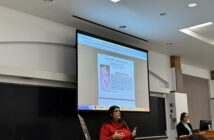
Andrew Schillaci
Is it wise to wipe out Puerto Rico’s debt?
Hurricane Maria devastated the island, but it was facing an economic crisis long before the storm’s damages.
After President Donald Trump’s visit to Puerto Rico on Oct. 2, the price of general obligation bonds — municipal bonds backed by Puerto Rico — plummeted as much as 31 percent as investors expected a default.
Puerto Rico has amassed a debt over $70 billion with a population of roughly 3.4 million and doesn’t have any way to pay it back. While 75 percent of the debt is held by individual investors, the rest is held by hedge funds such as Goldman Sachs, BlackRock and OppenheimerFunds. If the United States forgives Puerto Rico’s debt, then these investors will not get paid back.
However, these investors knew what they were getting into when they bought these bonds. Since the Puerto Rican bonds were graded with a high risk of default, investors were compensated with high bond yields. Investors purchased the debt at around 8 or 9 percent, 7 percentage points above U.S. Treasury yields.
In short, they were junk bonds. A default should not destroy financial confidence. However, the U.S. still needs to work with Puerto Rico to figure out how to restore confidence in the commonwealth.
On Oct. 3, the White House asked Congress to approve $29 billion in hurricane relief and debt forgiveness — nearly a month after lawmakers approved a first installment of $15 billion in disaster relief. Part of the proposal would also wipe out $16 billion in debt that the National Flood Insurance Program owes to the Treasury, helping Puerto Rico with more disaster relief.
The overarching problem is more budgetary spending steadily increasing in the U.S. deficit. With tax cuts on the table in Congress, it becomes increasingly unclear how the U.S. will generate enough revenue to keep up with its spending behavior.
That being said, it would be hard to argue that Puerto Ricans do not need the help. Conditions are so bad they are migrating out of necessity.
Although Trump’s new hurricane proposal will help relief efforts in the short term, I question whether Puerto Rico has the government support to prevent more economic hardships in the future.
Before the hurricane, Puerto Rico’s unemployment rates were as high as 12 percent. For comparison, the U.S. had as high as 10.2 percent during the 2008 crisis. Its population has been declining. The most skilled workers leave the country for better opportunities in the U.S., the debt is three-quarters of GDP and nearly 50 percent of the residents live below the poverty line.
Before Maria hit, the Puerto Rican government was being funded by the previously mentioned junk bonds, delaying payment of tax refunds and liquidating pension funds. All the while, a third of the island’s money was being used to service its debt. Unlike the Federal Reserve, Puerto Rico does not have the power to print more money to service its debts.
The long-term problem facing Puerto Rico is that the government needs to find new ways to attract a more skilled workforce and channel more investments into its economy.
One way the U.S. could help is by repealing the Jones Act, which has cost Puerto Ricans a fortune. The act states all maritime commerce between U.S. ports must be transported by U.S. ships under the American flag. Waivers for international vessels are given on a temporary basis for national defense or emergencies.
The problem with this protectionist law is it constantly gets suspended when the U.S. doesn’t have enough ships to transport emergency supplies. It makes shipping to Puerto Rico twice as expensive because of tariffs, fees and taxes.
The prices of Puerto Rican consumer goods are rising. Goods shipped from the mainland to Puerto Rico are double the price they are in neighboring islands, including the U.S. Virgin Islands, which are not subject to the Jones Act. Consequently, the cost of living is much higher.
While Trump did suspend the Jones Act for 10 days, the time period will not be enough for Puerto Rico. Repealing the act is a start, but powerful maritime lobbying groups may get in the way. Trump announced his intentions to “wipe away” the Puerto Rican debt, but his budget adviser, Mick Mulvaney, told the press not to take his words literally.
If the U.S. doesn’t rethink its policy toward Puerto Rico, then Wall Street is going to continue making money off of the humanitarian crisis. Lobbyists will prove to have more influence over Trump than a U.S. territory.
A lack of action will look horrible for a president who vowed to #DrainTheSwamp.
—
Andrew Schillaci, ’17, ’18G, is a columnist for The Brown and White. He can be reached at ajs317@lehigh.edu.





Comment policy
Comments posted to The Brown and White website are reviewed by a moderator before being approved. Incendiary speech or harassing language, including comments targeted at individuals, may be deemed unacceptable and not published. Spam and other soliciting will also be declined.
The Brown and White also reserves the right to not publish entirely anonymous comments.